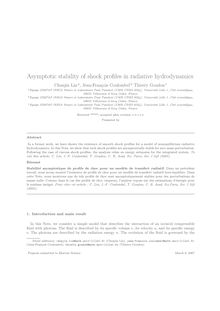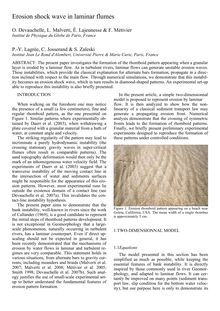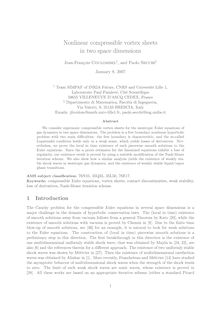#shock-waves

Documents
Asymptotic stability of shock profiles in radiative hydrodynamics Chunjin Lin a Jean Franc¸ois Coulombel b Thierry Goudon c
Jean - Franc¸Ois Coulombel

Documents
INTRODUCTION When walking on the foreshore one may notice the presence of a small a few centimeters fine and regular rhomboid pattern as the one presented on Figure Similar patterns where experimentally ob tained by Daerr et al when withdrawing a plate covered with a granular material from a bath of water at constant angle and velocity The striking regularity of the pattern may lead to incriminate a purely hydrodynamic instability the crossing stationary gravity waves in super critical flumes often result in comparable patterns The sand topography deformation would then only be the mark of an inhomogeneous water velocity field The experiments of Daerr et al suggest that a transverse instability of the moving contact line at the intersection of water and sediments surfaces might be responsible for the appearance of this ero sion patterns However most experimental runs lie outside the existence domain of a contact line see Devauchelle et al 2007a This invalidates the con tact line instability hypothesis The present paper aims to demonstrate that the bank instability well known in rivers since the work of Callander is a good candidate to represent the initial steps of rhomboid patterns development It is not exceptional in Geomorphology that a large scale phenomenon naturally occurring in turbulent rivers has a laminar counterpart Even if direct up scaling should not be expected in general it has been recently demonstrated that the mechanisms of erosion by water flows in laminar and turbulent re gimes are very comparable This statement holds in various situations from alternate bars to gravity cur rents including meanders and braids Malverti et al Malverti et al Métivier et al Smith Devauchelle et al 2007b Such anal ogy justifies the use of small scale experimental set up to better understand the fundamental features of erosion pattern formation
Jean Le Rond

Documents
Education
INTRODUCTION When walking on the foreshore one may notice the presence of a small a few centimeters fine and regular rhomboid pattern as the one presented on Figure Similar patterns where experimentally ob tained by Daerr et al when withdrawing a plate covered with a granular material from a bath of water at constant angle and velocity The striking regularity of the pattern may lead to incriminate a purely hydrodynamic instability the crossing stationary gravity waves in super critical flumes often result in comparable patterns The sand topography deformation would then only be the mark of an inhomogeneous water velocity field The experiments of Daerr et al suggest that a transverse instability of the moving contact line at the intersection of water and sediments surfaces might be responsible for the appearance of this ero sion patterns However most experimental runs lie outside the existence domain of a contact line see Devauchelle et al 2007a This invalidates the con tact line instability hypothesis The present paper aims to demonstrate that the bank instability well known in rivers since the work of Callander is a good candidate to represent the initial steps of rhomboid patterns development It is not exceptional in Geomorphology that a large scale phenomenon naturally occurring in turbulent rivers has a laminar counterpart Even if direct up scaling should not be expected in general it has been recently demonstrated that the mechanisms of erosion by water flows in laminar and turbulent re gimes are very comparable This statement holds in various situations from alternate bars to gravity cur rents including meanders and braids Malverti et al Malverti et al Métivier et al Smith Devauchelle et al 2007b Such anal ogy justifies the use of small scale experimental set up to better understand the fundamental features of erosion pattern formation
Jean Le Rond
4 pages
English
Collection
{{collectionTitle}}
Collection
{{collectionTitle}}
Collection
{{collectionTitle}}
{{productCategoryLabel}}
{{productTitle}}
{{productAuthors}}
{{productCategoryLabel}}
{{productThemeLabel}}
{{productTitle}}
{{productAuthors}}
{{productPages}}
{{productLanguageIsoCode}}
